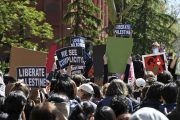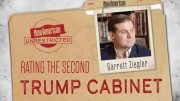
Immediately upon his termination as President Trump’s chief political strategist last week, Steve Bannon (shown) returned to his former position as executive chairman of Breitbart News. In fact, within hours of his return he chaired an “all-hands” meeting to plan the future.
Bannon said it was all part of a plan: “On August 7th, I talked to [Chief of Staff John] Kelly and to the President, and I told them that my resignation would be effective the following Monday, on the 14th. I’d always planned on spending one year. General Kelly has brought in a great new system, but I said it would be best [to leave]. I want to get back to Breitbart.” Upon his return to Brietbart, Bannon said:
In many ways I think I can be more effective fighting from the outside for the agenda President Trump ran on. And anyone who stands in our way, we will go to war with.
It was that feisty, take-no-prisoners mentality that many are blaming for his departure. Although it had been rumored for months, he sealed his own departure with a flourish: a bold declamation about his worldview that was published Wednesday in the liberal, anti-Trump American Prospect. His call to the editor caught him completely by surprise and although Bannon now claims that he thought his conversation with Robert Kuttner, the magazine’s co-founder and co-editor, was off the record, Kuttner himself said that Bannon was far too “savvy” to let that happen by accident.
Publicly expressing his worldview on China and North Korea was the final straw. Said Bannon to Kuttner:
We’re at economic war with China. It’s in all their literature. They’re not shy about saying what they’re doing. One of us is going to be a hegemon in 25 or 30 years and it’s gonna be them if we go down this path. On Korea, they’re just tapping us along. It’s just a sideshow….
To me, the economic war with China is everything. And we have to be maniacally focused on that. If we continue to lose it, we’re five years away, I think, ten years at the most, of hitting an inflection point from which we’ll never be able to recover.
As for North Korea, Bannon says that China is just using the fat boy running the place as a foil, telling Kuttner, “There’s no military solution [to North Korea’s nuclear threats.] Forget it. Until somebody solves the part of the equation that shows me that the ten million people in Seoul [South Korea’s capital just 35 miles from the border] don’t die in the first 30 minutes from conventional weapons, I don’t know what you’re talking about. There’s no military solution there. They’ve got us.”
That roundly contradicts President Trump’s strategy and was the final straw for his Chief of Staff John Kelly. Bannon’s plan was to “run the table” against the Chinese, telling Kuttner that he urged the president to file a complaint under Section 301 of the 1974 Trade Act against the Chinese coercion of technology transfers from American corporations as a condition for doing business there, and then follow them up with complaints under the Act for Chinese dumping of aluminum and steel. Bannon told Kuttner: “We’re going to run the tables on these guys. We’ve come to the conclusion that they’re in an economic war and they’re crushing us.”
Since Kelly arrived — touted as just the man to restore order in the West Wing — several heads have rolled, including that of Reince Priebus whom Kelly replaced as Trump’s chief of staff. Others included Anthony Scaramucci and Michael Dubke, both of whom served as Trump’s communications director; Michael Flynn, Trump’s first national security advisor; and Sean Spicer, his press secretary.
Bannon’s worldview was similar to that of the president in many respects. He advocated reductions in immigration and redrawing various trade agreements, particularly with China and Mexico. He supported significant spending on infrastructure but was opposed to government bailouts, calling them “socialism for the very wealthy.” He pushed to shrink the administrative state and strongly opposed the Paris “climate agreement.”
The New York Times admitted Bannon’s influence on policy was significant:
Bannon was nevertheless a driving force behind the president’s most high-profile policies: imposing a ban on travelers from several majority-Muslim countries; shrinking the federal bureaucracy; shedding regulations; and rethinking trade policies by aggressively confronting China and other countries.
Where he also got sideways however was with his support of increasing the tax rate on those earning $5 million a year or more to 44 percent to help pay for middle class tax cuts and his skepticism not only of continuing U.S. involvement in the war in Afghanistan and the Syrian Civil War, but also in threatening military involvement in the Venezuelan crisis.
Bannon disappointed many, including Roger Stone, a political activist and supporter of and advisor to Trump’s campaign for president. Wrote Stone:
Bannon engineered the ascent of Rex Tillerson at State despite the fact that Tillerson’s patron and chief influence is non-other than Condoleezza Rice, the neocon former Bush NSA Director and cheerleader for the Iraq war. Documents which leaked from the Presidential transition proved that Rice was Tillerson’s advocate and that several other staffers she recommended where quickly hired at State. Perhaps this is why Politico correctly tabbed the rise of veteran Romney-ites at State … Bannon delivered the Trump State Department into the hands of the Globalists….
There is no reason for conservatives to be upset about the … purge of Steve Bannon. He did a lot to help himself and not much to help us.
An Ivy League graduate and former investment advisor, Bob is a regular contributor to The New American magazine and blogs frequently at LightFromTheRight.com, primarily on economics and politics. He can be reached at [email protected].
Photo of Steve Bannon: By Gage Skidmore from Peoria, AZ, United States of America – Steve Bannon, CC BY-SA 2.0, https://commons.wikimedia.org/w/index.php?curid=56638768



